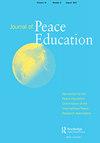Considerations in education for forgiveness and reconciliation: lessons from Arab and Muslim majority contexts
IF 1.3
Q3 EDUCATION & EDUCATIONAL RESEARCH
引用次数: 0
Abstract
ABSTRACT This article presents lessons learned on the education for forgiveness and reconciliation in Muslim and Arab majority contexts, especially as part of civic engagement or across content areas. It first presents a brief review of the literature on forgiveness and reconciliation and ways they are interrelated in the larger Arab and Muslim contexts. Secondly, it points out religious and cultural sources that ground the practice of forgiveness and reconciliation. Thirdly, it presents the analysis of forgiveness stories collected from various Arab communities and discusses the main obstacles that hinder adopting a forgiveness and reconciliation agenda. Finally, it proposes forgiveness education and pedagogy based on stories to provide the framework and mechanisms to advance forgiveness and reconciliation education in schools and education spaces. We recommend utilizing local stories and storytelling as a method to delve into interpersonal and social conflicts.宽恕与和解教育的考虑:来自阿拉伯和穆斯林多数背景的教训
摘要本文介绍了在穆斯林和阿拉伯人占多数的背景下,特别是作为公民参与的一部分或跨内容领域进行宽恕与和解教育的经验教训。它首先简要回顾了关于宽恕与和解的文献,以及它们在更大的阿拉伯和穆斯林背景下相互关联的方式。第二,它指出了宽恕与和解做法的宗教和文化根源。第三,它分析了从各个阿拉伯社区收集的宽恕故事,并讨论了阻碍通过宽恕与和解议程的主要障碍。最后,它提出了基于故事的宽恕教育和教学法,为在学校和教育空间推进宽恕与和解教育提供了框架和机制。我们建议利用当地故事和讲故事的方法来深入研究人际和社会冲突。
本文章由计算机程序翻译,如有差异,请以英文原文为准。
求助全文
约1分钟内获得全文
求助全文

 求助内容:
求助内容: 应助结果提醒方式:
应助结果提醒方式:


